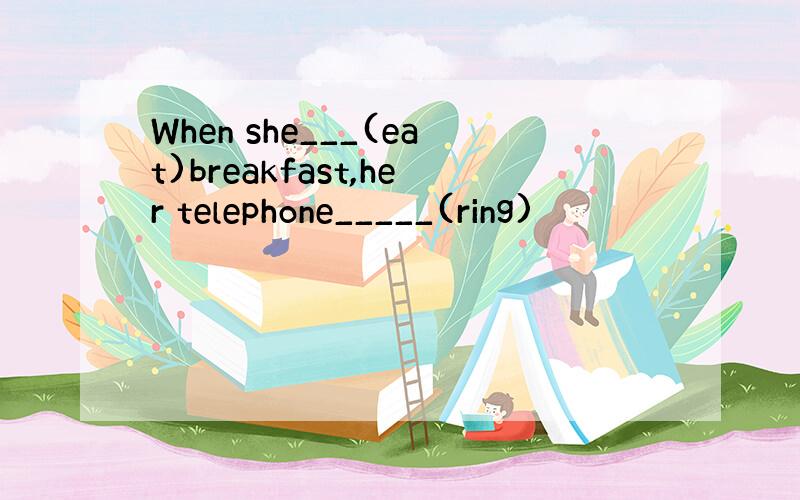When she___(eat)breakfast,her telephone_____(ring)
来源:学生作业帮 编辑:大师作文网作业帮 分类:英语作业 时间:2024/11/14 03:51:50
When she___(eat)breakfast,her telephone_____(ring)
when my father____(repair) the bike,my mom____(call)him.
when she ____(have)dinner,someone____(knock)at the door.
When my mother____(sweep)the floor,a friend______(come)to my house.
When Jack arrived at the cinema,the film_______(begin).
when my father____(repair) the bike,my mom____(call)him.
when she ____(have)dinner,someone____(knock)at the door.
When my mother____(sweep)the floor,a friend______(come)to my house.
When Jack arrived at the cinema,the film_______(begin).

was eating,ran
was repairng,called
was having,knocked
was sweeping,came
had begun.
when引导状语从句,表示多种语法意义:
1.表示时间,意为“当……时;在……的时候”.
A.在时间、条件等状语从句里,用一般现在时表示将来时;当需要表达将来完成的意义时,必须使用现在完成时来代替.
如:( 1 ) When you see him,please say hello to him.见到他时,代我问他好.
( 2 ) When you have finished your experiment,please tidy the lab and put everything back in the cupboards.当你们做完实验后,请把实验室整理好并把物品放回柜子中.
B.表示过去发生的事情,在 when 引导的时间状语从句的主从复合句中,动作发生在先的用过去完成时,在后的用过去时.
如:( 1 ) When I was in Japan,I bought some beautiful pearls.我在日本时,买了一些漂亮的珍珠.
( 2 ) When I reached the station,the train had left.当我到达火车站时,火车已经开走了.
2.表示前面的叙述所没有提到过的信息.它总是对所描述的事件予以引人注目的强调,意为“这时;突然”;当位于句末的分句具有引种用法时,大致有以下三种情况:
A.when 分句前面的分句使用过去进行时.
如:( 1 ) He was still smiling when the door opened and his wife came in.他正笑着的时候,门突然开了,他妻子走了进来.
( 2 ) I was thinking of this when I heard my name called.我正想着这件事时,突然听到有人叫我的名字.
B.when 分句前面的分句使用 was (were) about to,was (were) on the point 等.
如:( 1 ) We were about to start when it began to rain.我们刚要出发就开始下雨了.
( 2 ) He was on the point of leaving when someone knocked at the door.他刚要走就有人敲门.
C.when 分句之前的分句用过去完成时,其中 sb had hardly / scarcely /barely … when 已成为固定词组.如:
( 1 ) We had hardly fallen asleep when the bell rang.我们刚刚入睡,铃声就响了起来.
( 2 ) He had scarcely arrived when he had to leave again.他刚刚到达就又要离开了.
3.表示条件,相当于 if ,引导条件状语从句.
如:How can I get a job when I can't even read or write?如果我连读和写都不会,我怎么能找到工作呢?
4.表示对比,主要有以下两种情况:
A.相当于 whereas,while,since,意为“既然;然而”.
如:( 1 ) How can I help them to understand when they won't listen to me?既然他们不愿听我的,我又怎么能帮助他们弄明白呢?
( 2 ) They have only three copies when we need five.他们只有三本,而我们却需要五本.
B.when 从句中使用虚拟语气,意为“本来……却……”.
如:( 1 ) She paid when she could have entered free.本来可以免费入场,而她却付了款.
( 2 ) She stopped trying when she might have succeeded next time.她本来下次有可能获得成功,但她却不再尝试了.
( 3 ) They were gossiping,when they should have been working.他们本该工作,却在那里说别人的闲话.
5.由 when 等引导的状语从句,如果主语与主句的主语一致或是 it ,谓语动词又含 be 动词时,主语和 be 动词常常被省略,就变成“ when + V-ing/ V-ed/ adj/ 介词词组”的结构.
如:( 1 ) When in Rome,do as Romans do.入乡随俗.
( 2 ) When (we are ) young,we are full of hope.年轻时,我们大家总是充满希望.
( 3 ) Don't reach sideways when standing on a ladder.站在梯子上时,不要侧着身子去够东西
was repairng,called
was having,knocked
was sweeping,came
had begun.
when引导状语从句,表示多种语法意义:
1.表示时间,意为“当……时;在……的时候”.
A.在时间、条件等状语从句里,用一般现在时表示将来时;当需要表达将来完成的意义时,必须使用现在完成时来代替.
如:( 1 ) When you see him,please say hello to him.见到他时,代我问他好.
( 2 ) When you have finished your experiment,please tidy the lab and put everything back in the cupboards.当你们做完实验后,请把实验室整理好并把物品放回柜子中.
B.表示过去发生的事情,在 when 引导的时间状语从句的主从复合句中,动作发生在先的用过去完成时,在后的用过去时.
如:( 1 ) When I was in Japan,I bought some beautiful pearls.我在日本时,买了一些漂亮的珍珠.
( 2 ) When I reached the station,the train had left.当我到达火车站时,火车已经开走了.
2.表示前面的叙述所没有提到过的信息.它总是对所描述的事件予以引人注目的强调,意为“这时;突然”;当位于句末的分句具有引种用法时,大致有以下三种情况:
A.when 分句前面的分句使用过去进行时.
如:( 1 ) He was still smiling when the door opened and his wife came in.他正笑着的时候,门突然开了,他妻子走了进来.
( 2 ) I was thinking of this when I heard my name called.我正想着这件事时,突然听到有人叫我的名字.
B.when 分句前面的分句使用 was (were) about to,was (were) on the point 等.
如:( 1 ) We were about to start when it began to rain.我们刚要出发就开始下雨了.
( 2 ) He was on the point of leaving when someone knocked at the door.他刚要走就有人敲门.
C.when 分句之前的分句用过去完成时,其中 sb had hardly / scarcely /barely … when 已成为固定词组.如:
( 1 ) We had hardly fallen asleep when the bell rang.我们刚刚入睡,铃声就响了起来.
( 2 ) He had scarcely arrived when he had to leave again.他刚刚到达就又要离开了.
3.表示条件,相当于 if ,引导条件状语从句.
如:How can I get a job when I can't even read or write?如果我连读和写都不会,我怎么能找到工作呢?
4.表示对比,主要有以下两种情况:
A.相当于 whereas,while,since,意为“既然;然而”.
如:( 1 ) How can I help them to understand when they won't listen to me?既然他们不愿听我的,我又怎么能帮助他们弄明白呢?
( 2 ) They have only three copies when we need five.他们只有三本,而我们却需要五本.
B.when 从句中使用虚拟语气,意为“本来……却……”.
如:( 1 ) She paid when she could have entered free.本来可以免费入场,而她却付了款.
( 2 ) She stopped trying when she might have succeeded next time.她本来下次有可能获得成功,但她却不再尝试了.
( 3 ) They were gossiping,when they should have been working.他们本该工作,却在那里说别人的闲话.
5.由 when 等引导的状语从句,如果主语与主句的主语一致或是 it ,谓语动词又含 be 动词时,主语和 be 动词常常被省略,就变成“ when + V-ing/ V-ed/ adj/ 介词词组”的结构.
如:( 1 ) When in Rome,do as Romans do.入乡随俗.
( 2 ) When (we are ) young,we are full of hope.年轻时,我们大家总是充满希望.
( 3 ) Don't reach sideways when standing on a ladder.站在梯子上时,不要侧着身子去够东西
When she___(eat)breakfast,her telephone_____(ring)
When I __ my breakfast,I shall ring her up.为什么用have had
She___ _____ food for breakfast.
英语翻译when do you eat breakfast?i eat breakfast before i workw
When do people usually eat breakfast?同义句转换
people,when,eat,breakfast,do,usually连词成句
When do you eat breakfast?是什么意思,用中文怎样回答?
When I____(leave)home,my father____(eat)breakfast.
When does Anna eat breakfast?(用never回答句子)
when,eat,do,you,breakfast,morning,in,the,连在一起是什么
when do she eat breakfast 有什么错
Her eyes were red.She___.